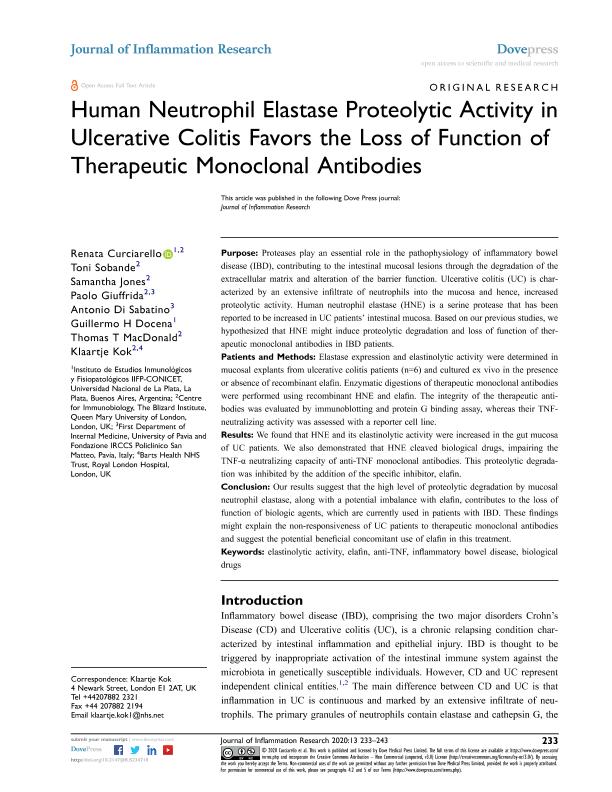Artículo
Human neutrophil elastase proteolytic activity in Ulcerative colitis favors the loss of function of therapeutic monoclonal antibodies
Curciarello, Renata ; Sobande, Toni; Jones, Samantha; Giuffrida, Paolo; Di Sabatino, Antonio; Docena, Guillermo H.
; Sobande, Toni; Jones, Samantha; Giuffrida, Paolo; Di Sabatino, Antonio; Docena, Guillermo H. ; Macdonald, Thomas T.; Klaartje, Kok
; Macdonald, Thomas T.; Klaartje, Kok
 ; Sobande, Toni; Jones, Samantha; Giuffrida, Paolo; Di Sabatino, Antonio; Docena, Guillermo H.
; Sobande, Toni; Jones, Samantha; Giuffrida, Paolo; Di Sabatino, Antonio; Docena, Guillermo H. ; Macdonald, Thomas T.; Klaartje, Kok
; Macdonald, Thomas T.; Klaartje, Kok
Fecha de publicación:
22/05/2020
Editorial:
Dove Press
Revista:
Journal of Inflammation Research
ISSN:
1178-7031
Idioma:
Inglés
Tipo de recurso:
Artículo publicado
Clasificación temática:
Resumen
Purpose: Proteases play an essential role in the pathophysiology of inflammatory bowel disease (IBD), contributing to the intestinal mucosal lesions through the degradation of the extracellular matrix and alteration of the barrier function. Ulcerative colitis (UC) is characterized by an extensive infiltrate of neutrophils into the mucosa and hence, increased proteolytic activity. Human neutrophil elastase (HNE) is a serine protease that has been reported to be increased in UC patients’ intestinal mucosa. Based on our previous studies, we hypothesized that HNE might induce proteolytic degradation and loss of function of therapeutic monoclonal antibodies in IBD patients. Patients and Methods: Elastase expression and elastinolytic activity were determined in mucosal explants from ulcerative colitis patients (n=6) and cultured ex vivo in the presence or absence of recombinant elafin. Enzymatic digestions of therapeutic monoclonal antibodies were performed using recombinant HNE and elafin. The integrity of the therapeutic antibodies was evaluated by immunoblotting and protein G binding assay, whereas their TNFneutralizing activity was assessed with a reporter cell line. Results: We found that HNE and its elastinolytic activity were increased in the gut mucosa of UC patients. We also demonstrated that HNE cleaved biological drugs, impairing the TNF-α neutralizing capacity of anti-TNF monoclonal antibodies. This proteolytic degradation was inhibited by the addition of the specific inhibitor, elafin. Conclusion: Our results suggest that the high level of proteolytic degradation by mucosal neutrophil elastase, along with a potential imbalance with elafin, contributes to the loss of function of biologic agents, which are currently used in patients with IBD. These findings might explain the non-responsiveness of UC patients to therapeutic monoclonal antibodies and suggest the potential beneficial concomitant use of elafin in this treatment.
Archivos asociados
Licencia
Identificadores
Colecciones
Articulos(IIFP)
Articulos de INST. DE ESTUDIOS INMUNOLOGICOS Y FISIOPATOLOGICOS
Articulos de INST. DE ESTUDIOS INMUNOLOGICOS Y FISIOPATOLOGICOS
Citación
Curciarello, Renata; Sobande, Toni; Jones, Samantha; Giuffrida, Paolo; Di Sabatino, Antonio; et al.; Human neutrophil elastase proteolytic activity in Ulcerative colitis favors the loss of function of therapeutic monoclonal antibodies; Dove Press; Journal of Inflammation Research; 13; 22-5-2020; 233-243
Compartir
Altmétricas



